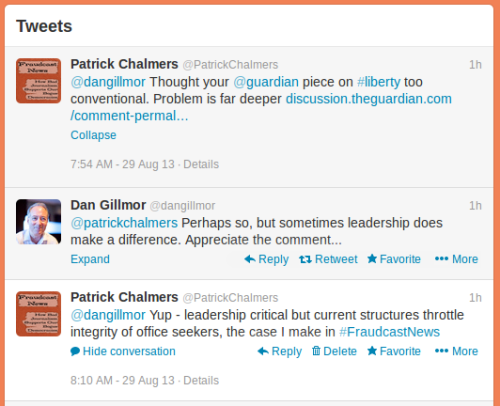The theatre of elections – US or otherwise
I have a lot of time for the work of Dan Gillmor, director of the Knight centre for digital media entrepreneurship at Arizona State University’s Walter Cronkite school of journalism and mass communication. Not least of my likes is his publishing model for his book Mediactive (2010), about how people can be empowered as new media users. It inspired my own approach to publishing Fraudcast News. Where I have reservations, though, is in Dan’s all-too-conventional perspective on the realities of political power, as demonstrated in this opinion piece he wrote for the Guardian’s Comment is free section.
The title, “America’s next president had better believe in restoring liberty”, pretty much encapsulates the problem running through what he presents as the imagined speech of a presidential candidate running in the 2016 election. It suggests any future candidate with a chance of winning under the hijacked electoral system might ever say such a thing and then implement it in the highly unlikely event of victory.
It would be good to get Dan to incorporate some of the analysis and suggestions of Fraudcast News into his own critique of media and government.
I tweeted him my comment and got a response out of him, as shown below, so here’s hoping.

This was my reply to his original piece:
All well and good but this imagined speech and its messages supposes that its audience members accept the legitimacy of the presidential election process itself.
Speaking as a Brit, I am unimpressed with both the US presidential election process and its (rough) equivalent in my own country’s general elections. Both are lame affairs that offer no real choices to their citizens, whatever the razzamatazz of their campaigns and the rhetoric of the candidates.
The crisis in governance – intimately linked to the legitimate questions you raise about liberty Dan – has come about precisely because our political systems have been hijacked by narrow, uber-wealthy elites. The participation of we the people in the related theatre that is elections has almost nothing to do with the political decision making that ensues.
You say, for example:
we’ve chosen to limit liberties in order – we’ve told ourselves – to have more safety or less trouble
Except “we” haven’t really chosen anything at all – it’s been largely foisted on us with little more say so than making some consumer choices that no one ever said were linked to a coordinated global programme of mass surveillance.
None of that is to even touch on the question of why anyone might want to attack the United States or its interests. Howard Zinn anyone?
I like your work Dan, and your book publishing model of free PDFs and paid-for hard copies inspired me to use the same approach in my own critique of journalism and democracy, but I think your reading of all this is way too conventional. No presidential candidate who made a speech such as this would get anywhere near becoming a viable contender under the current rules of the game.
That makes the exercise a bit pointless IMHO.

